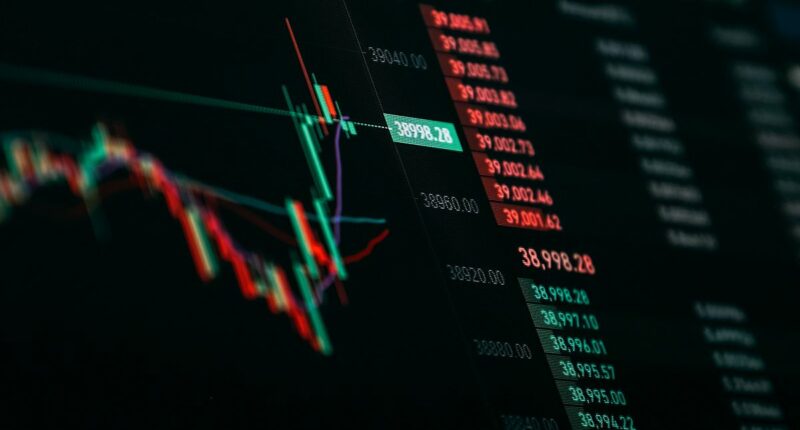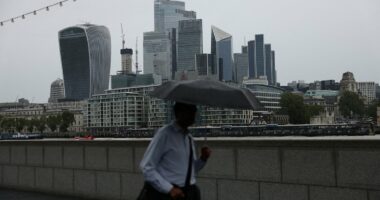Share this @internewscast.com
Whether we welcome it or not, artificial intelligence (AI) is becoming a permanent fixture in our lives, transforming them in both positive and negative ways.
Major corporations are enthusiastic about AI, often as a means to reduce labor expenses. In contrast, some authoritarian regimes exploit it for questionable activities. As consumers, we increasingly interact with AI, whether through online searches or while engaging with businesses.
AI can be empowering at one moment and frustrating at the next.
Despite AI’s integration into our daily routines, this doesn’t guarantee that all companies pioneering this new wave of industrial change will endure.
Much like the internet boom of the late 1990s, there will be both victors and casualties. Some companies will thrive, while others will inevitably falter—an illustration of the corporate world’s “survival of the fittest” mentality.
What remains undeniable is that for numerous individual investors, the AI surge has quietly bolstered our financial portfolios, often without us even being fully aware.
Fantastic. I say this because many of the investment funds that we hold inside our pensions, Isas and investment portfolios have far more exposure to AI ‘titans’ than we probably realise.

Many funds have exposure to the so-called ‘magnificent seven’
They may be global funds with rather innocuous names or, more likely, investment vehicles which slavishly track a US or world market index (the bedrock of many workplace pension schemes). Both these fund categories tend to be tech and AI heavy.
By ‘titans’, I mean those US stocks dubbed the magnificent seven: technology leaders Alphabet (parent of Google), Amazon, Apple, Meta (owner of Facebook), Microsoft, Nvidia and Tesla. All are involved in the AI boom in one way or another.
For example, by manufacturing the computer chips necessary to power the demand for ‘generative AI’ (the creation of content used in videos and articles), using AI to transform their own businesses (robotics, for instance), or offering AI services to customers. These seven have driven the US equity market ever higher.
Over the past five years, the S&P 500 Index, which tracks the stock market performance of leading US companies, has moved ahead by 84 per cent.
Over the same period, Nvidia, the index’s biggest component, has seen its share price soar an almost unbelievable 1,264 per cent. Stratospheric.
Shares in Meta have risen by 325 per cent while four of the remaining five have jumped between 127 and 210 per cent.
The only exception is Amazon, where the share price has grown by a ‘meagre’ 45 per cent (I’d take a five-year investment return of 45 per cent any day).
To put all these numbers into context , the FTSE 100 and FTSE All-Share indices have risen by 50 and 43 per cent, respectively.

Some experts have said that a stock market correction over AI is due
The US stock market – and the magnificent seven in particular – have been the places to be.
Looking at all these numbers, and acknowledging the high valuations that some tech stocks stand at, it is not difficult to build a case arguing that the AI-fuelled bubble in the United States cannot continue for much longer.
A correction, it seems, is due which could cause stock markets to tumble worldwide, as they did when the dotcom bubble burst in March 2000.
It’s an issue that I and some of my financial colleagues have written about in recent weeks – and it’s a concern that has been raised by the bosses of both the International Monetary Fund and the Bank of England.
Indeed, the latest global fund manager survey from Bank of America indicates that just over half of investment managers believe AI stocks are in a bubble – with 45 per cent describing it as the biggest ‘tail risk’ to markets.
But, as we saw with Nvidia’s financial results last Wednesday, AI companies continue to defy the doomsayers.
The investment case for AI still holds good.
Nvidia’s sales for the third quarter of this year were nothing but mind blowing: a staggering $57 billion (£43.5billion), 62 per cent higher than the same time last year – and ahead of analysts’ forecasts ($54.9 billion).
The final quarter figures for this year, Nvidia said, would likely be better. Its shares rose in response before falling back slightly on Thursday.
So the AI boom continues and even some ‘bears’ are now coming round to admitting maybe it has more legs: the bubble is not yet ready to burst.
Foremost among them is Michael Burry, the hedge fund manager who famously made billions of dollars from predicting the 2008 global financial crisis – and who was portrayed by Christian Bale in the 2015 film The Big Short.
Earlier this month, Burry finally admitted defeat and gave up shorting shares (in effect betting that their prices would fall) in Nvidia and US software company Palantir Technologies, another key AI player. They hadn’t fallen as he expected they would.

Michael Burry gave up shorting shares in Nvidia as the price continued to soar
So what should you as an investor do? Run for the hills in anticipation of a market crash? Sit still and ride the AI investment wave? Or tread a middle ground and do a thorough audit of your investments to ensure they are sufficiently diversified?
To help pick the right answer, I met up with Jason Hollands of wealth manager Evelyn Partners in the wake of Nvidia’s exceptional results and picked his brains over a cup of espresso. For the record, Evelyn manages assets of £67 billion, which enables Hollands to draw on a wealth of investment insight and knowledge.
He believes that it is nigh impossible to predict when – and if – the AI bubble is going to burst. ‘Second guessing the top of a market is extremely difficult to get right,’ he says.
To emphasise his point, he says that the dotcom bubble, which ran from 1995 through to its eventual bursting in March 2000, wasn’t simply a case of US tech stocks rising relentlessly in value until they crashed.
In their journey upwards there were several corrections along the way, as measured by the
Nasdaq Composite Index (a tech stock bellwether). For example, it fell by more than 10 per cent between May and July 1996, February and April 1997 – and from October to December 1997.
It then corrected 30 per cent between July and October 1998 – before rising again with the bubble popping in March 2020.
‘AI investing mania began three years ago,’ says Hollands, ‘so the key question to ask is not whether we are in a bubble, but at what stage we are at?
‘To go back to the dotcom bubble, are we in 1997 or 1999 territory – or early 2000?
‘Bail out too early and you could miss a lot of return.’
Rather than bail out of AI stocks and US equities altogether, he believes it is better to sit down and review your investment portfolio.
If it’s heavily skewed towards the US and tech stocks, rebalance so that your investments are spread across other stock markets (the UK, Europe, Japan, the broader Far East, and emerging markets) and assets such as gold, infrastructure and bonds.
You might be surprised to know that in sterling terms, the stock markets I have just referred to have all outperformed the magnificent seven (collectively) and the S&P 500 this year to date.
Also consider readjusting your US exposure away from the big tech stocks by using funds which give you equal weighting across all constituents of the S&P 500.
Another great diversifier, which has worked well for me, is to invest in dividend-friendly companies and investment funds.
Dividend income is your comfort blanket when markets are falling.
So embrace AI, but be sure to diversify and diversify again.
And don’t panic if markets fall. Investing rewards the faithful.









